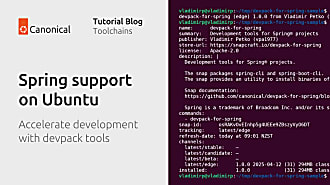Marco Ceppi
on 7 July 2017
The official Ubuntu install of Kubernetes is first to deliver the new Kubernetes 1.7 release with full enterprise support.
This is a Canonical distribution of pure-upstream Kubernetes, designed for ease of deployment and operations on public clouds and on-premise on bare metal, VMware, or OpenStack. The Canonical distribution osf Kubernetes is also easy to spin up on developer laptops using LXD containers for component isolation and distributed system simulation.
The Canonical installer makes upgrades simple, enables you to grow the K8s cluster dynamically, and takes advantage of Ubuntu’s kernel optimisations on every cloud. The Ubuntu kernel is widely considered the best kernel for large-scale container deployments.
This release fully supports the latest Kubernetes 1.7 features including improved component security, stateful applications, and extensibility. We encourage you to check out the upstream release notes.
Upgrade from the Canonical Distribution of Kubernetes 1.6
It’s easy to upgrade an existing CDK 1.6.x cluster with these instructions. To upgrade from 1.5.x, first upgrade to 1.6, then to 1.7. Canonical ensures that each release of CDK is upgradable to the next, including upgrades of components such as etcd as needed.
Featuring
- Support for Kubernetes v1.7 (see the upstream release notes)
- Symmetric key authentication for users and components by default
- Robust upgrade and scaling operations for compute and storage
- LXD deployment for hyper-dense or development environments
- Consistent operations across AWS, Azure, Google Cloud, Oracle Cloud, Rackspace and enterprise virtualisation infrastructure
Cluster Authentication Updates
CDK 1.7 introduces a more secure-by-default cluster configuration by replacing self-signed x.509 certificate authentication with token auth for cluster components and basic auth for the default cluster admin user.
You’ll need to download new admin credentials (for fresh deployments as well as upgrades from CDK 1.6):
juju scp kubernetes-master/0:config ~/.kube/config
If desired, you can change the admin password:
juju config kubernetes-master client_password=<my-new-password>
How to Contact Us
We’re normally found in these Slack channels and attend these sig meetings regularly:
We also monitor the Kubernetes and Juju mailing lists, and hang out in the #juju channel on Freenode IRC.
Project Resources
- Home page – https://jujucharms.com/canonical-kubernetes/
- Bug reports – https://github.com/juju-solutions/bundle-canonical-kubernetes
- Charm source – https://github.com/kubernetes/kubernetes/tree/master/cluster/juju
- Enterprise support – http://www.ubuntu.com/advantage
PRs, suggestions, questions, and bug reports are welcome! If you’re looking for Kubernetes support, consulting, or training – contact us!



